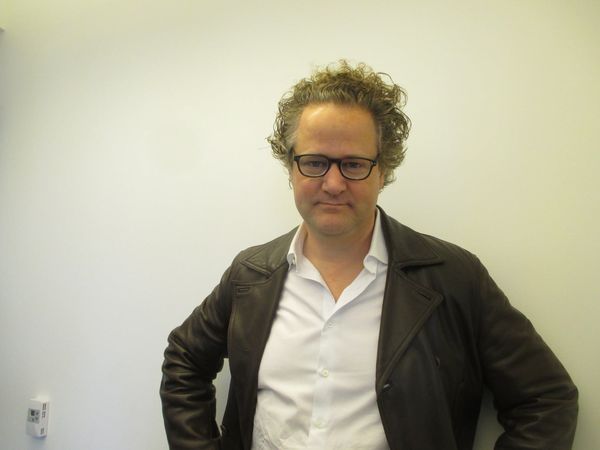 |
| Florian Henckel von Donnersmarck on Milan Kundera: "He says great novels are written where history is kind of alive. In a way, I think that goes for Germany also." Photo: Anne-Katrin Titze |
In the second installment of my conversation with Florian Henckel von Donnersmarck on his now Oscar-shortlisted film Never Look Away (Werk Ohne Autor), the director of the Oscar-winning The Lives Of Others (Das Leben Der Anderen), spoke about his longtime editor Patricia Rommel, who also worked with Angelina Jolie (First They Killed My Father, By The Sea, In The Land Of Blood And Honey) after Jolie starred opposite Johnny Depp in Florian's The Tourist.
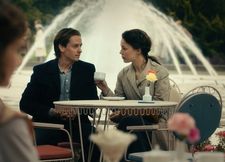 |
| Kurt Barnert (Tom Schilling) with Ellie Seeband (Paula Beer) |
Little Kurt Barnert (Cai Cohrs) sees the infamous Entartete Kunst (Degenerate Art) exhibition with his beloved aunt Elisabeth (Saskia Rosendahl). A museum guide (Lars Eidinger) proclaims his Nazi ideology, but neither of them buy it. This sets the tone in Never Look Away, co-produced with Jan Mojto, Quirin Berg, Max Wiedemann, and Christiane Henckel von Donnersmarck.
Kurt (Tom Schilling) will become an artist, first with limited freedom in the East, later in West Germany, where at the Kunstakademie in Düsseldorf under the tutelage of a thinly disguised Joseph Beuys substitute (Oliver Masucci as Professor Antonius van Verten) he discovers his genius. He will also find out about a link between his wife Ellie's (Paula Beer) controlling gynecologist father, Professor Seeband (Sebastian Koch), and poor Elisabeth, who found an early and brutal death.
In a most audacious and questionable montage, the camera (cinematography by Caleb Deschanel) enters the gas chamber with the aunt and the group of women with her, Händel on the soundtrack, while the naked women collapse and suffocate. The film intercuts to bombs falling on Dresden, as well as soldiers, Kurt’s uncles, falling in battle at the front.
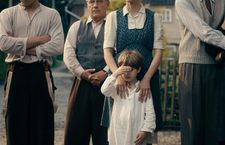 |
| Young Kurt (Cai Cohrs) with his father Johann (Jörg Schüttauf) and family. |
The producer/screenwriter/director Florian Henckel von Donnersmarck takes on portions of Gerhard Richter's biography and twirls them into his very own reflection of nothing less than the question "What is art?" and German history of the 20th century.
Anne-Katrin Titze: You like working with layers?
Florian Henckel von Donnersmarck: Oh, yeah.
AKT: I'm very curious about the montage. You have the gas chamber, Dresden burning, the uncles falling at the front. Händel [on the soundtrack]. Was that in the screenplay already?
FHvD: Yes.
AKT: Completely as it was? There were no changes in the editing?
FHvD: Nothing, no, no. I planned the things kind of very carefully. In editing I remember one principal that my wonderful editor Patricia Rommel has - she has this very German name but she's very French - even from The Lives of Others onwards, where she said "Ein guter Schnitt ist eine gute Blende." Basically, a good cut is something that should also work as a fade.
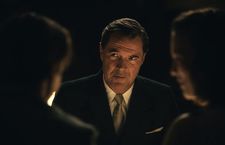 |
| Florian's The Lives of Others star Sebastian Koch is the despicable Professor Seeband, father of Ellie in Never Look Away. |
There's always this idea in movies that if you do a fade, the two images have to match perfectly. And there has to be a kind of relation between the two. She says the same has to be for any cut. If you cut things together that are not in a way planned to be cut together, it's very hard to make it work on the same level. So we conceived these things very carefully to fit together.
Basically that whole sequence was to show, it was completely seen from the perspective of this little boy. And how for this little boy all the craziness of war and the extremities of ideology and all that - to him all it translates to is suffering, you know? He's losing the little girl that he is in love with, he's losing his uncles on the Eastern Front. He's losing his aunt in the gas chamber.
He doesn't understand or compute or have any feelings for what these things mean. For him it's just all suffering, you know? At the end of the day, that's the essence of ideology in war - it will lead to suffering and destruction and murder. The analysis is secondary and is avoided at all cost for that very reason.
In Germany, actually there were a few articles, which was really interesting - maybe more like one - but where they said, this is - about the same exact sequence that you're talking about - it's showing the suffering of the perpetrators. [Florian asks in German if there is a better word for Täter].
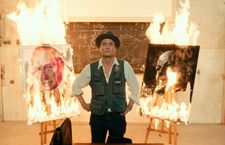 |
| Oliver Masucci as Professor Antonius van Verten, Kurt's mentor at the Kunstakademie. |
AKT: No, perpetrators is the correct word.
FHvD: That I find, that's kind of where the trouble commences. If you see a little boy, 12-year-old boy, from whose perspective this is seen - if you see him as a perpetrator, what does it mean? That's exactly the kind of problem. That's exactly what it's supposed to be a montage against. I wanted to say, okay, let's make the ultimate kind of anti-war, anti-ideology montage and stay completely true to the perspective of the boy and show how everything, all these things, destroy him.
It is true, I am interested in layers because I think these things are completely connected. In a way we, as Germans, in a certain way are in a unique position maybe to tell the world stories in history. Because every craziness that went on in the whole world, went on in our country in an extreme form.
The whole world was divided into an Eastern and Western block. Germany was divided into an Eastern and Western block. We even had a city, Berlin, that was again divided. Sometimes within families you had these extreme divisions. In a way, you take any German personal history and it will be a reflection of world history.
AKT: Good point.
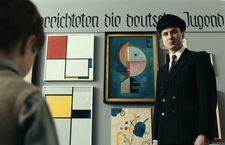 |
| Kurt (Cai Cohrs) with the guide (Lars Eidinger) at the Entartete Kunst (Degenerate Art) exhibition. |
FHvD: And I think that's also why the German post-war art is still so dominant. There's an essay by [Milan] Kundera where he talks about where the great novels come about. He says great novels are written where history is kind of alive. In a way, I think that goes for Germany also. Maybe it's more other forms of storytelling now. It comes naturally to us to tell stories that have an unfortunate relevance on a political level. Even if they're very personal.
AKT: Jan Mojto, your producer, was quoted saying that questions such as "What is the defining quality of the Germans?" - that he is so amazed how you would tackle a question like that.
FHvD: Okay, I didn't see that quote.
AKT: It's a difficult question. But you are going in that direction?
FHvD: Well, I mean, I just try to maybe describe something that I find interesting. Not so much answer a question. Germany is a country that at the end of the day consists of what is it? 85 million individuals? I think in some countries it's more visible that in our personal lives we cannot escape the history of our country.
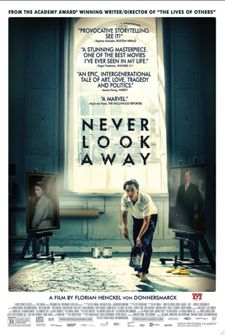 |
| Never Look Away poster - opens in New York at The Paris Theatre on January 25 |
I always feel that I'm a complete individual and all this but then I meet someone else who's also German, also born in 1973 and I realise how many similarities our lives have, you know?
AKT: Yes.
FHvD: And it's just crazy and I feel like, also, maybe I'm more influenced by external things than I think. My grandparents were as far removed at the end of the day from all the craziness of Berlin as possible. They lived in Silesia.
AKT: My relatives, too.
FHvD: In the countryside where my grandfather had an agricultural, like a farm. Still, if you look at his life, it was what influenced it most - it was the fact that all of Silesia was lost because of the crimes of the Nazis. He had to then flee, you know, lost everything he had at an age where it was very difficult for him to start again. Even my father in a way was uprooted, although he was born in 1935. Even his life was greatly influenced by that.
My mother was from Magdeburg, from East Germany and then fled to the West. So all these people who are not in a way particularly political people and led regular lives - their lives are defined by what's going on on that political scale. In a way those layers - yes, it's the right word, they are layers - they are completely interconnected. And I find it a challenge, I like the challenge of weaving them together in that interconnected way.
Read what Florian Henckel von Donnersmarck had to say on Germany's Oscar submission Never Look Away (Werk Ohne Autor).
Never Look Away (Werk Ohne Autor) screens at Edinburgh International Film Festival on June 23.





















